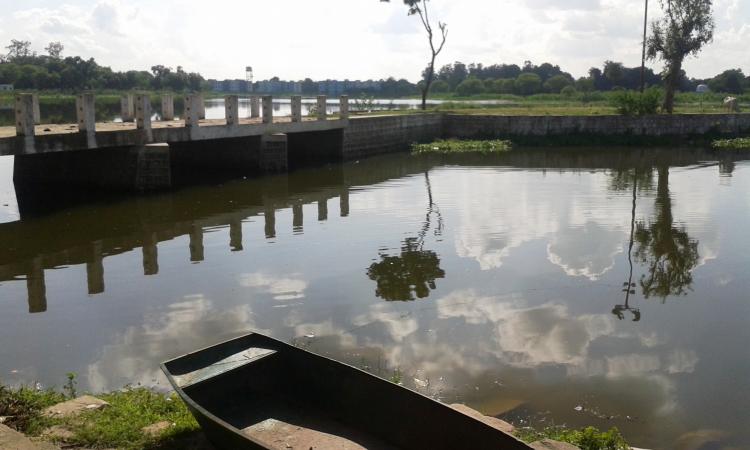
S. M. Sehgal Foundation, in collaboration with DCB Bank and NIRDPR (National Institute of Rural Development & Panchayati Raj) as the knowledge partner, held the fourth and final workshop of ‘Jalagam’, the Capacity Building and Experience Sharing series, in Jhansi, Uttar Pradesh, on March 14, 2024.
Ms. Anjali Makhija, Trustee & CEO, S M Sehgal Foundation, inaugurated the workshop and launched the white paper consolidating best practices to promote community stewardship in mitigating climate change and promoting water security at the grassroots. The white paper features community stewardship for water management from various regions across India.
It shares pathways for building community resilience to climate change through an ecosystem approach, including women and youth as key stakeholders in water security.
The workshop was graced by Dr. Heera Lal, IAS, Special Secretary of Irrigation for the Government of Uttar Pradesh, who joined as the chief guest. As a climate action leader, he remarked, “We have been disrespecting the water resource, without realising that water is correlated with agriculture, environment and even income. To be able to address water security, we need to have it in our thoughts and actions.”
He shared about his extensive work in Banda, in the Bundelkhand region, where they collectively rejuvenated wells and ponds. Additionally, they developed simple yet innovative communication tools to effectively convey the message of water conservation to communities, beginning with schoolchildren. “Minimising the use of plastics, the biggest enemy of water, and planting trees to add oxygen to the environment and water-efficiency in agriculture are solutions that urgently need to be implemented,” he emphasised.
Discussant Ms. Ruchira Bhattacharya, Assistant Professor, NIRDPR, elaborated on the scope of planning on water management and highlighted the role of training and capacity building in enhancing water efficiency within communities, and mutual learning.
Following this, Mr. Munish Gangwar (Retd. GM, NABARD) delivered a special address titled 'Integrated Perspectives on Community-Led Water Security', shedding light on crucial aspects of sustainable water management, highlighting how as an individual one can contribute with other partners for the overall benefit of the community. He further shared that it is the people who are suffering the most due to water scarcity, know about solutions the best. Altruistic leaders are present in each village, and they need to be nurtured. He emphasised that the model villages developed should be replicated on a large scale.
The first panel session discussed two pertinent themes, viz., community championing the cause of water security and climate change impacting health via water availability and quality. The two thematic discussions in this panel were moderated by Mr. Dhruv Singh, Executive Director, Margshree Trust and Mr. Lalit Mohan Sharma, Principal Scientist, S M Sehgal Foundation. The panellists, Ms. Kalpana Khare, Director, Gramonnati Sansthan; Ms. Nidhi Tripathi; and Mr. Anil Kumar, Water Champions, shared grassroots insights.
The second panel, which explored the Inter-stakeholder perspective and convergence initiatives to mitigate water security issues in Bundelkhand, was moderated by Mr. Ajay Srivastava, Secretary, Sai Jyoti Sansthan. Dr. Sadhana Chaurasia, Associate Professor and Head, Department of Energy and Environment, Mahatma Gandhi Chitrakoot Gramodaya Vishwavidyalaya; Dr. Shailendra Nath Pandey, Water Consultant; and Dr. Smriti Tripathi, Assistant Professor, Institute of Environment and Development Studies, shared their experiences.
Ms. Niti Saxena, Principal Scientist, Rural Research and Development, S M Sehgal Foundation, discussed the way forward and plans for future collaboration.
About ‘Jalagam’ Workshop Series
‘Jalagam’ marks a significant step towards featuring community adaptability and sustenance mechanisms at the intersectionality of water and climate change. The workshop series aims to foster collaboration and share experiences in water resources management and bring out challenges and practices across regions in the states of Delhi, Maharashtra, Telangana, and Uttar Pradesh.
“Water, the lack of it impedes progress and sustainability of the nation, its people, and the planet. We cannot ignore the relationship between water and waste management affecting the overall health and water of a nation. The Bank’s CSR projects and activities mainly focus on water crisis, climate change, and sustainable livelihoods & and preferably Nature Based Solutions,” says Mr. Murali M. Natrajan, Managing Director and CEO, DCB Bank.
DCB Bank supports, collaborates, and works with communities and experts across India, to implement impactful changes in sustainable livelihood, protection of water, and climate change adaptation projects that are sustainable over the long term. Projects with S M Sehgal Foundation in watershed development have revived more than 5,00,000 square feet of water bodies and ponds and harvested more than 35 crore litres of rainwater. This has positively impacted over 14,000 marginal and small farmers.
“Many villages have benefited from the combined efforts of DCB Bank and the Sehgal Foundation regarding water conservation and sustainability. The workshop series aims to feature community efforts in resilience and pave the way for addressing the pressing issues of water and climate change,” says Anjali Makhija, Trustee and CEO, S M Sehgal Foundation.
DCB Bank Limited and S M Sehgal Foundation formed a partnership in 2017 to embark on community projects focused on water. This collaboration has made a significant impact, benefiting more than 14,500 community members across five states, namely Andhra Pradesh, Haryana, Madhya Pradesh, Maharashtra, and Rajasthan in India, resulting in the harvesting of over 350 million (35 crore) litres of water. The projects include groundwater augmentation through check dams, rejuvenating ponds for surface water storage, and rainwater harvesting units in schools to enable access to drinking water.
/articles/water-security-amid-climate-challenges